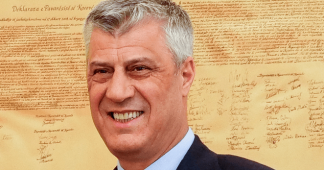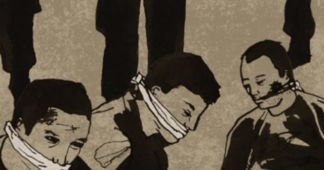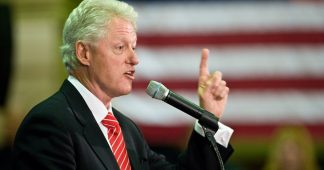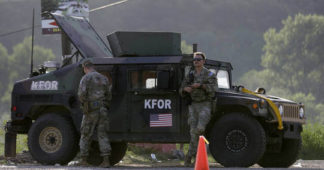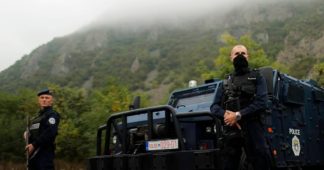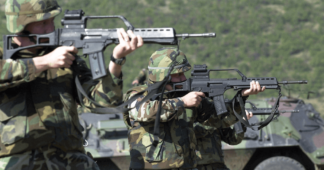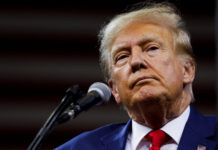Kosovo Liberation Army leader Hashim Thaçi on trial for war crimes
From March 24 to June 9, 1999, NATO bombed Serbia for 77 days. It was the first major war on European soil since the Second World War—even this fact is suppressed and denied today in view of the war in Ukraine.
War propaganda was in full swing at the time: NATO was laying waste to Serbian cities in order to defend “human rights” and to stop the “ethnic cleansing” Serbia was accused of carrying out in Kosovo. Greens, liberals and pseudo-left groups, who only a few weeks before had been invoking pacifism, eagerly took up this propaganda and switched to the war camp with flying colours. In Germany, the Greens and Social Democrats organised the first military combat mission involving German armed forces since Hitler’s defeat in 1945.
Now, the man whom Joe Biden embraced in 2009 and called the “George Washington of Kosovo” is facing a special court as a war criminal. On Monday, the trial of Hashim Thaçi, the co-founder and spokesman of the Kosovo Liberation Army (KLA) and later Kosovo’s foreign minister, head of government and president, began in The Hague.
The 70-page indictment accuses Thaçi and three other high-ranking KLA members—Kadri Veseli, Rexhep Selimi and Jakup Krasniqi—of being responsible for more than a hundred murders and numerous other war crimes in 1998 and 1999. All four are accused of having personally participated in threatening or abusing prisoners. The prosecution has handed over 56,000 documents to Thaçi’s defence lawyers that prove these accusations.
The indictment describes in detail the brutality with which the KLA acted against Serbs, Roma and other non-Albanians. Kosovo Albanians who opposed their policies and supported Thaçi’s rival Ibrahim Rugova, who advocated a peaceful solution to the conflict with Serbia, were mercilessly persecuted. The KLA ran numerous detention centres where several hundred inmates were held and, according to witnesses, abused with torture, mock executions and death threats.
Victims were beaten with guns, baseball bats, metal tools and wooden sticks and tortured using electric shocks or feigned drowning. Other prisoners and family members had to watch the torture or were forced to abuse one another. Others were shot by the dozens.
The killings continued even after NATO forced Kosovo to secede from Serbia and stationed its 50,000-strong Kosovo Force (KFOR) there. The KLA took revenge on Serbs, Roma and Rugova supporters, dozens of whom were murdered. Thaçi, whose wartime name was “The Snake,” was considered their strong man.
The Thaçi trial is an object lesson in imperialist war propaganda, which stops at no lie to camouflage its predatory and criminal aims. This applies not only to the war in Yugoslavia at the time but also to today’s war in Ukraine.
Here, too, criminals are celebrated as freedom fighters—who, like the members of the Azov Battalion, wear Nazi insignia and for eight years persecuted all those in eastern Ukraine who spoke Russian or had sympathies for Russia. Here, too, politicians—who hang on the apron strings of oligarchs and Western puppet masters, or like Ukraine’s President Zelensky unscrupulously send tens of thousands of young soldiers to their deaths for NATO’s goals—are glorified as democrats and freedom fighters.
The positive and negative signs are simply reversed. For example, for nine years, not a day has gone by without the media proclaiming that Russia’s annexation of Crimea was a violation of Ukraine’s territorial integrity, which was unacceptable under international law and historically unprecedented. But the immediate objective of the 1999 NATO war was to force Kosovo’s secession, which was indisputably part of Serbian territory under international law. After the war it was placed under international administration, and in 2008, against Serbia’s declared will, it proclaimed its state independence, which was immediately recognised by the US and most European states.
With the secession of Kosovo, a destitute province with 1.8 million inhabitants, the imperialist powers completed the division of Yugoslavia into seven powerless petty states completely dependent upon them. Above all, Serbia, traditionally politically and culturally linked to Russia, was thus to be isolated and weakened.
Hashim Thaçi played a key role in this criminal enterprise. In 1999, Madeleine Albright and Joschka Fischer, the foreign ministers of the US and Germany, invited the KLA spokesman to the Rambouillet Conference, where he provided NATO with the alibi for bombing Yugoslavia.
It was already known at the time that Thaçi’s KLA was carrying out terrorist attacks against Serbian targets and political opponents and financed itself through criminal enterprises, such as trafficking in drugs, women and human organs. The CIA had even classified the KLA as a terrorist organisation before NATO enlisted its services and reclassified it as a “liberation movement.”
After NATO forced the secession of Kosovo, it relied on Thaçi and the KLA to maintain “peace and order” there. After independence, Thaçi became foreign minister, prime minister and finally president of the new country, establishing a corrupt and criminal oligarchic regime.
While many Serb politicians were arrested and hauled before The Hague War Crimes Tribunal, Thaçi and the KLA leaders were under American and European protection. In Kosovo itself, they spread a climate of fear.
“Almost no one dared to testify against KLA veterans,” the Frankfurter Allgemeine described the situation in Kosovo after the Yugoslav war. “And those who did take the risk fared badly: Inexplicable car accidents with fatal outcomes, ‘suicides’ and sniper attacks could be the result.”
The Chief Prosecutor of The Hague Tribunal for the former Yugoslavia, Carla Del Ponte, also reported intimidation and terror in her memoirs published in 2009: “Witnesses were so fearful and intimidated that they were afraid to even talk about the presence of the KLA in some areas, let alone actual crimes.”
Those who spoke anyway put their lives in danger and had to be taken to other countries with their families, Del Ponte reports. Even members of the KFOR force and some Hague Tribunal judges were afraid of attacks.
The situation only changed when Swiss lawyer Dick Marty presented a comprehensive report on KLA crimes in 2011. Marty did this on behalf of the Council of Europe, to which 47 states belong and which is independent of the European Union.
The EU then appointed its own special investigator. It chose US lawyer John Clint Williamson, who was considered “credible” because he had co-authored the indictment against Serb leader Slobodan Milošević. After more than two years, Williamson concluded that Marty’s accusations were solidly substantiated.
Now the EU felt compelled to set up a special court in The Hague, formally part of Kosovo’s judicial system but staffed by foreign judges and prosecutors and financed by European funds.
The special court investigated for over five years without any charges being brought. Presumably the whole thing would have fizzled out had it not been for conflicts between the US and the EU.
Richard Grenell, appointed by President Donald Trump in 2019 as special envoy for negotiations between Serbia and Kosovo, worked closely with President Thaçi, while the EU leaned on his rival, head of government Albin Kurti. When Thaçi was about to leave for a summit meeting with Serbian President Aleksandar Vučić at the White House in Washington in June 2020, the Special Court published the indictment. Thaçi had to cancel the trip and resign.
The fact that the trial finally opened two and a half years after the indictment was published does not at all mean that Thaçi will eventually be convicted. According to the presiding judge, the trial is expected to last several years. The accused are being defended by top US law firms. And several prominent individuals, including the NATO Supreme Commander in the Yugoslav war Wesley Clark and the former French Foreign Minister Bernard Kouchner, are expected to testify in support of Thaçi.
But even Thaçi’s lawyers do not deny that the crimes described in the indictment took place. They are pursuing a familiar defence strategy from the Nuremberg trials of the Nazi war criminals: The KLA units had indeed committed crimes, but Thaçi, founding member, commander and official spokesman of the KLA, had known nothing about them!
In any case, the trial of Thaçi has already shattered the lies with which the Yugoslav war was justified. The WSWS had already categorically rejected this “clumsy and cynical propaganda campaign,” pointed out the real reasons for the war and campaigned for the building of an antiwar movement of the international working class based on a socialist programme.
An article posted in the WSWS on May 24, 1999 titled “Why is NATO at war with Yugoslavia? World Power, Oil and Gold” [1], stated: “Once the fraudulent claims of the NATO spokesmen and the falsifications of the media are stripped away from this war, what remains? A naked aggression by imperialist countries against a small federation, in which the official reasons given for the onslaught serve as a smokescreen.”
The article linked the Yugoslav war to US plans to dominate the Eurasian landmass and warned: “The potential for a conflict with Russia, it should now be clear, has actually increased over the past ten years.” This warning has since been dramatically borne out.
——-
[1] David North, A Quarter Century of War: The US Drive for Global Hegemony 1990-2016, Oak Park, MI: Mehring Books, 2016, p. 123
Also read
Former war crimes prosecutor alleges Kosovan army harvested organs from Serb prisoners
We remind our readers that publication of articles on our site does not mean that we agree with what is written. Our policy is to publish anything which we consider of interest, so as to assist our readers in forming their opinions. Sometimes we even publish articles with which we totally disagree, since we believe it is important for our readers to be informed on as wide a spectrum of views as possible.
